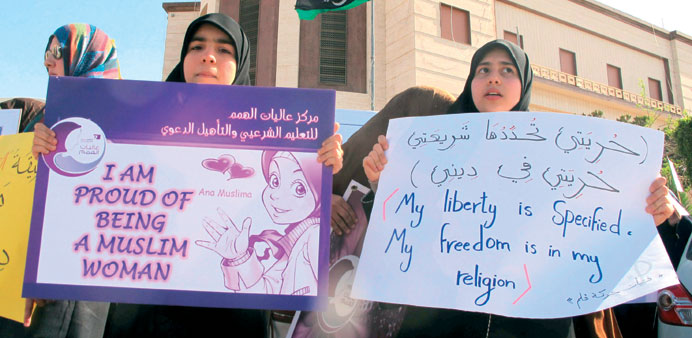Libyan women hold posters, during a protest against a UN document regarding women’s rights, in front of the Libyan Foreign Ministry in Tripoli yesterday. According to media reports, the UN Commission on the Status of Women headed by Mchelle Bachelet is due to issue a document on fighting violence against women.
AFP/Jeddah
The Muslim world yesterday expressed hopes for better ties with the Vatican under new Pope Francis, after years of strained relations with Benedict XVI who was seen as hostile to Islam.
The 57-member Organisation of Islamic Cooperation, and the Al Azhar, Sunni Islam’s highest seat of learning, came out with similar statements expressing this sentiment as they welcomed the Argentine’s election.
OIC chief Ekmeleddin Ihsanoglu, in a letter of congratulations, said he hoped “the relationship between Islam and Christianity will regain its cordiality and sincere friendship” under the new head of the Roman Catholic Church.
Ihsanoglu said that “over the last eight years, the OIC has called for and worked hard to propagate the idea of ‘historic reconciliation between Islam and Christianity’.”
“I would like at this historic moment to reiterate this call,” wrote the secretary general of the organisation based in the Saudi city of Jeddah.
Al Azhar also called for “better relations” with the Vatican under the new Pope following the suspension of dialogue after statements by Benedict XVI sparked Muslim anger.
“As soon as a new policy emerges, we will resume the dialogue with the Vatican which was suspended in early 2011,” Mahmud Azab, adviser for inter-faith affairs to Al Azhar imam Ahmed al-Tayyeb, told AFP.
Benedict’s papacy was plagued by a series of public relations blunders that offended many from the start of his reign. In 2006, the German Pontiff sparked fury across the Muslim world when he recounted an anecdote in which the Prophet was described as a warmonger who spread evil teachings by the sword.
Dialogue resumed in 2009, but was again severed after Benedict strongly called for protection of Christian minorities following a January 2011 suicide bombing at a church in Alexandria, Egypt’s second city.
At the time, the Cairo-based Al Azhar said it would cut ties again with the Vatican over Benedict’s “repeated treatment of Islam in a negative way, and his claims that Christians and others are oppressed in the Middle East.”
According to Ali Bakr, an expert on Islamic affairs at the Al Ahram Centre for Political and Strategic Studies, “a restoration of good ties between the Muslim world and the Vatican depends on the new Pope’s personality, thinking and vision for reconciliation.”
In the wake of uprisings that erupted in 2011, Islamists have emerged as the most powerful political force in several countries across the Middle East and North Africa, exacerbating a feeling of insecurity among minority Christians.
This was especially the case in Egypt, the Arab world’s most populous country with more than 80mn inhabitants and where the Muslim Brotherhood’s Mohamed Mursi was elected president in June 2012.
Christians in the region are also fearful about the spread of the Salafi movement. But following the election of the new Pope, Shaaban Abdel Alim of the hardline Al Nour party in Egypt moved to assure that “as Salafists, we are not against dialogue (with the Vatican), but rather we welcome it.”
Georges Fahmi, an expert on Copts from the Al Badael Centre for Political Studies in Cairo, said he expected the new pope to “uphold common values of Islam and Christianity” and to promote a return to dialogue.
Coptic church set on fire in Benghazi after Egypt protest
Unknown assailants set fire to an Egyptian Coptic church in the eastern Libyan city of Benghazi yesterday, witnesses said, the second attack on the building in weeks.
Residents said the attack appeared to be in reaction to a protest at the Libyan embassy in Cairo earlier this week where Egyptian protesters burnt a Libyan flag outside the embassy and, according to police at the scene, held aloft a cross.
The demonstrators there said they were protesting the death of an Egyptian Copt in an explosion in front of a church in Libya a month ago.
The church in downtown Benghazi was heavily damaged and charred inside, witnesses said, with bookshelves ransacked. As crowds gathered at the scene, the fire was eventually put out.
Officials said they were not aware of any injured as the church was empty when the attack happened.
“There were rumours of plans to set fire to the church. We didn’t hear anything today though, we just saw the smoke billowing,” one resident who gave his name as Bodelal said.
This was the second attack on the Egyptian Coptic church in Benghazi in weeks. Gunmen had previously attacked it, assaulting two priests.
About 250 gathered again in front of the embassy in Cairo yesterday, clashing with Egyptian riot police, a security source said.
“This could be reaction against what happened at the embassy. They burnt the Egyptian flag in front the embassy,” another Benghazi resident, Abdusalem Salem, said.
Libya’s small Christian community has expressed fears over Islamist extremism as the government struggles to impose its authority over armed groups which have refused to lay down their weapons since the 2011 war that ousted Muammar Gaddafi.
In December, an explosion at a building belonging to a Coptic church in Dafniya, close to the western city of Misrata, killed two Egyptian men and wounded two others. Last month, four foreigners were arrested in Benghazi on suspicion of being Christian missionaries and printing books about Christianity.

